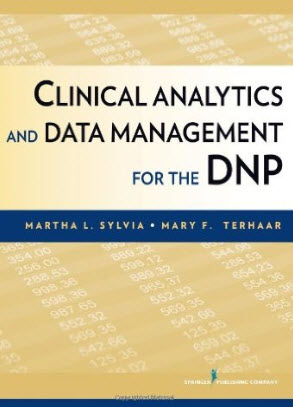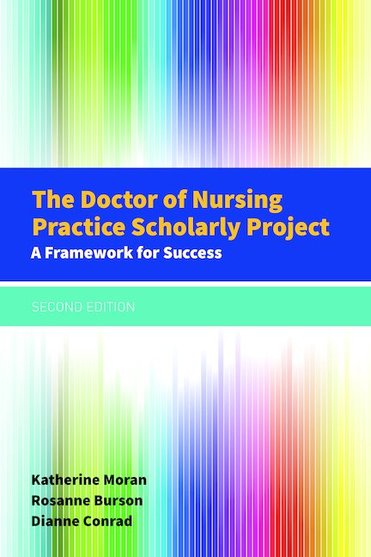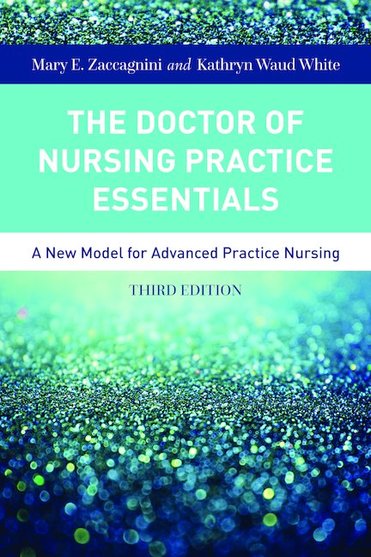| Course Number: | NR702 |
|---|---|
| Course Title: | DNP Project & Practicum I |
| Course Credits: | 2-4 Credits (Practicum 2-4) |
| Prerequisite: | All students: NR700, NR701, NR703, NR704, NR706, and NR708 |
Syllabus
Overview
Course Description
The focus of this course is on broad issues for DNP-prepared nurses practicing across healthcare systems to advance nursing practice. Students identify a nursing practice problem and plan for evidence-based practice change using advanced nursing judgment in the practicum setting.
Clinical Compliance Requirements
Chamberlain does not have specific practicum compliance requirements for DNP students. Meeting student compliance requirements will only be necessary when the student’s practicum facility requires it. Students who do not complete the facility-specific requirements prior to the start of the course will not be registered or will be withdrawn from the course. Students should direct any questions to DNPPracticum@chamberlain.edu.
Textbooks and Resources
Required Textbooks
The following books are required for this course:

American Psychological Association. (2010). Publication manual of the American Psychological Association (6th ed.). Washington, DC: Author.
Harris, J. L., Roussel, L., Thomas, T., & Dearman, C. (2016). Project planning and management: A guide for nurses and interprofessional teams (2nd ed.). Sudbury, MA: Jones & Bartlett Learning.
Moran, K., Burson, R., & Conrad, D. (2017) The Doctor of Nursing Practice scholarly project. (2nd ed). Burlington, MA: Jones & Bartlett.
Sylvia, M. & Terhaar, M (2014). Clinical analytics and data management for the DNP. New York: Springer Publishing Company.
Zaccagnini, M. E. & White, K. W. (2017). The Doctor of Nursing Practice essentials: A new model for advanced practice (3rd ed.). Burlington, MA: Jones & Bartlett Publishers.

Sylvia, M. & Terhaar, M (2014). Clinical analytics and data management for the DNP. New York: Springer Publishing Company.
Physical Books and Supplies
To obtain all your books and supplies, visit the online Chamberlain bookstore at https://bookstore.chamberlain.edu/.
eBook Details
First Time Using VitalSource?
Step 1: View the VitalSource Video
Step 2: Register with VitalSource Bookshelf Online
- Click the cover or title of your eBook. A new window will open.
- Enter email address and password. Bookshelf Online will open.
Step 3: Access the Desktop and Mobile Versions
You must complete Step 2 prior to using the desktop or mobile versions.
Already Registered? 3 Ways to Access Your eBooks

Online
Access your eBook by clicking on the book cover or title in the syllabus page. Bookshelf Online will open.

Desktop
Download your eBooks and use them whether you're connected to the Internet or not.

Mobile
Download the app and get your eBooks on your iPhone, iPad, or Android device.
Program Outcomes
The outcomes for the Doctor of Nursing Practice (DNP) degree program are as follows:
1
Apply biophysical, psychosocial, sociopolitical and cultural principles to integrative healthcare economics, nursing science and ethics in evidence-based advanced nursing practice to improve the nation\'s health using cultural humility and population-focused healthcare that is holistic and person-centered.(DNP Essentials VII, VIII; DNP/C: I-IV).
2
Formulate a professional identity leadership role as an extraordinary DNP-prepared nurse in application, formation and reformation of health policy and advocacy in healthcare at micro, meso and macro levels (DNP Essentials V; DNP/C: III-IV).
3
Synthesize scientific methods and underpinnings to develop best practices with a spirit of inquiry to shape advanced nursing judgment and systems of care for person/family and populations to improve care focused outcomes (DNP Essentials I, III; DNP/C: III-IV).
4
Build advanced nursing practice on relationship-based care and care-focused delivery models that embrace political, ethical, professional, economic, socially just and culturally appropriate services across healthcare systems (DNP Essentials VIII; DNP/C: II-IV).
5
Integrate scientific-based theories and concepts that facilitate best practices with a spirit of inquiry for the nature and significance of health and healthcare delivery phenomena with strategies to improve healthcare delivery and outcomes, appreciating theory-based healthcare for evidence-based practice (DNP Essentials I, III; DNP/CC: II-IV).
6
Distinguish organizational and transformational leadership that fosters and promotes patient safety, human flourishing, integration of healthcare technology and informatics to improve patient safety and care-focused outcomes for quality improvement and systems thinking that improves and transforms healthcare (DNP Essentials II, IV; DNP/C: I-III).
7
Assimilate concepts of healthcare technology and informatics to make data-driven decisions that inform advanced nursing practice and person-centered care systems that are nurse-sensitive and person/family-and population focused (DNP Essentials IV; DNP/C: I-III).
8
Exercise intra- and inter-professional collaboration as an extraordinary DNP-prepared nursing role model for collegiality and professionalism across healthcare systems to facilitate optimal care and care-focused outcomes that improve person/family and population health or practice outcomes (DNP Essentials VI; DNP/C: I-III).
9
Synthesize conceptual and analytical skills in evaluating links among practice, organization, population, fiscal and policy issues as a basis for transformational change across healthcare systems (DNP Essentials V; DNP/C: III-IV).
Course Outcomes
Chamberlain College of Nursing courses are built to align course content with specific Course Outcomes (COs). The COs define the learning objectives that the student will be required to comprehend and demonstrate by course completion. The COs that will be covered in detail each week can be found in the Overview page in that particular week. Whenever possible, a reference will be made from a particular assignment or discussion back to the CO that it emphasizes.
Upon completion of this course, the student will be able to do the following.
1
Synthesize scientific knowledge and practice expertise to support a change in practice-relevant evidence-based practice. (POs 3, 4, and 5)
2
Integrate theory with scientific knowledge and practice expertise for informed practice. (POs 3 and 5)
3
Apply effective strategies for managing practice issues inherent in healthcare delivery at micro-, meso-, and macrosystem levels. (PO 3)
4
Uses project management processes to assess and plan the DNP Project. (POs 4 and 8)
5
Design an evidence-based practice-change project to address a practice issue at the appropriate system's level. (POs 4, 5, and 8)
6
Demonstrate accountability for advocacy of the DNP prepared nursing role in practice settings. (POs 2 and 6)
7
Translate evidence-based principles into building a culture of practice scholarship among DNP prepared nurses. (PO 5)
Course Schedule
| Week, COs, and Topics | Readings | Assignments |
|---|---|---|
Week 1 CO 1 Problem & PICOT Question for the DNP Project | Carman, M. J., Wolf, L. A., Henderson, D., Kamienski, M., Koziol-McLain, J., Manton, A., & Moon, M. D. (2013). Developing your clinical question: The key to successful research. Journal of Emergency Nursing, 39 (3), 299-301. doi:10.1016/j.jen.2013.01.011 Retrieved from http://proxy.chamberlain.edu:8080/login?url=http://ovidsp.ovid.com/ovidweb.cgi?T=JS&CSC=Y&NEWS=N&PAGE=fulltext&AN=00005465-201305000-00019&LSLINK=80&D=ovft Gillam, S., & Siriwardena, A.N. (2014). Evidence-based healthcare and quality improvement. Quality in Primary Care, 22, 125-132. Retrieved from http://proxy.chamberlain.edu:8080/login?url=http://search.ebscohost.com/login.aspx?direct=true&db=mnh&AN=24865339&site=eds-live Moran, K., Burson, R., & Conrad, D. (2017) The Doctor of Nursing Practice scholarly project (2nd ed.). Burlington, MA: Jones & Bartlett.
Zaccagnini, M. E. & White, K. W. (2016). The Doctor of Nursing Practice essentials: A new model for advanced practice (3rd ed.). Burlington, MA: Jones & Bartlett Publishers.
| Practicum Logs (on-going) Conference Call with Student, Preceptor, and Faculty (within first 2 weeks) Collaborative Threaded Discussion (graded) |
Week 2 CO 1 Assessment of the Organizational Setting of the DNP Project | Harris, J. L., Roussel, L., Thomas, T., & Dearman, C. (2016). Project planning and management: A guide for nurses and interprofessional teams (2nd ed.). Sudbury, MA: Jones & Bartlett Learning.
Moran, K., Burson, R., & Conrad, D. (2017) The Doctor of Nursing Practice scholarly project (2nd ed.). Burlington, MA: Jones & Bartlett.
| Practicum Logs (on-going) Conference Call with Student, Preceptor, and Faculty (within first 2 weeks) Collaborative Threaded Discussion (graded) |
Week 3 COs 2, 3, and 4 Scientific Underpinnings of the DNP Project | Kamienski et al. (2013). Searching the literature: What is known (and not known) about your topic? Journal of Emergency Nursing, 39 (4), 395-397. http://proxy.chamberlain.edu:8080/login?url=http://ovidsp.ovid.com/ovidweb.cgi?T=JS&CSC=Y&NEWS=N&PAGE=fulltext&AN=00005465-201307000-00020&LSLINK=80&D=ovft Wolf et al. (2013). Evaluating evidence for practice. Journal of Emergency Nursing, 39 (2), 197-199. http://proxy.chamberlain.edu:8080/login?url=http://ovidsp.ovid.com/ovidweb.cgi?T=JS&CSC=Y&NEWS=N&PAGE=fulltext&AN=00005465-201303000-00019&LSLINK=80&D=ovft Moran, K., Burson, R., & Conrad, D. (2017) The Doctor of Nursing Practice scholarly project (2nd ed.). Burlington, MA: Jones & Bartlett.
Zaccagnini, M. E. & White, K. W. (2017). The Doctor of Nursing Practice essentials: A new model for advanced practice (3rd ed.). Burlington, MA: Jones & Bartlett Publishers.
| Practicum Logs (on-going) Collaborative Threaded Discussion (graded) |
Week 4 COs 2, 3, 4, and 5 Evaluation Plan for the DNP Project | Harris, J. L., Roussel, L., Thomas, T., & Dearman, C. (2016). Project planning and management: A guide for nurses and interprofessional teams (2nd ed.). Sudbury, MA: Jones & Bartlett Learning.
Moran, K., Burson, R., & Conrad, D. (2017) The Doctor of Nursing Practice scholarly project (2nd ed.). Burlington, MA: Jones & Bartlett.
Sylvia, M. & Terhaar, M (2014). Clinical analytics and data management for the DNP. New York: Springer Publishing Company.
| Practicum Logs (on-going) Collaborative Threaded Discussion (graded) Mid-Term Preceptor Evaluation (required, not graded) |
Week 5 COs 3, 4, and 5 Planned Change Process for the DNP Project | Harris, J. L., Roussel, L., Thomas, T., & Dearman, C. (2016). Project planning and management: A guide for nurses and interprofessional teams (2nd ed.). Sudbury, MA: Jones & Bartlett Learning.
Moran, K., Burson, R., & Conrad, D. (2017) The Doctor of Nursing Practice scholarly project (2nd ed.). Burlington, MA: Jones & Bartlett.
M. A., Sandau, K. E., & Diedrick, L. (2013). Evidence-based practice models for organizational change: overview and practical applications. Journal of Advanced Nursing, 69(5), 1197-1209. doi:10.1111/j.1365-2648.2012.06122.x http://search.ebscohost.com.proxy.chamberlain.edu:8080/login.aspx?direct=true&db=rzh&AN=2012054508&site=ehost-live | Practicum Logs (on-going) Collaborative Threaded Discussion (graded) |
Week 6 COs 4, 5, and 6 Plan for Dissemination of the Results of the DNP Project | None | DNP Project Proposal (graded) Practicum Logs (on-going) Collaborative Threaded Discussion (graded) |
Week 7 COs 4, 5, and 7 Proposal for the DNP Project | None | DNP Project Presentation (graded) You Decide Reflection (graded) Practicum Logs (on-going) Collaborative Threaded Discussion (graded) |
Week 8 CO 1 Ethical Considerations of Planning, Implementing, and Evaluating the DNP Project | Baker, K. M., Clark, P. R., Henderson, D., Wolf, L. A., Carman, M. J., Manton, A., & Zavotsky, K. E. (2014). Identifying the differences between quality improvement, evidence-based practice, and original research. Journal of Emergency Nursing, 40(2), 195-197. doi:10.1016/j.jen.2013.12.016 http://search.proquest.com.proxy.chamberlain.edu:8080/docview/1557610690/fulltextPDF/CA5BF01537AB4E73PQ/22?accountid=147674 Harris, J. L., Roussel, L., Thomas, T., & Dearman, C. (2016). Project planning and management: A guide for nurses and interprofessional teams (2nd ed.). Sudbury, MA: Jones & Bartlett Learning.
Rutherford-Hemming, T., Vlasses, F.R., & Rogers, J.K. (2012). Practice makes perfect: Tips for successful institutional review board submissions. The Journal of Continuing Education in Nursing, 43(5), 203-208. http://search.proquest.com.proxy.chamberlain.edu:8080/docview/1013660533/fulltextPDF/F2685CA662124F3CPQ/5?accountid=147674 Stausmire, J. M. (2014). Quality improvement or research--deciding which road to take. Crit Care Nurse, 34(6), 58-63. doi:10.4037/ccn2014177 http://search.ebscohost.com.proxy.chamberlain.edu:8080/login.aspx?direct=true&db=rzh&AN=2012807611&site=ehost-live | Collaborative Threaded Discussion (not graded, but required) Practicum Logs (graded) Final Preceptor Evaluation (required, not graded) All work must be complete by Wednesday, Week 8, 11:59 pm (MT). |
Turnitin
Students agree that, by taking this course, all work submitted for a grade is subject to submission for textual similarity review to Turnitin.com for the detection of plagiarism. All submitted papers will be included as source documents in the Turnitin.com reference database solely for the purpose of detecting plagiarism of such papers. Use of the Turnitin.com service is subject to the Terms and Conditions of Use posted on the Turnitin.com site.
Purpose:
The purpose of this Turnitin® policy is to facilitate the formative development of scholarly writing skills.
Overview:
Turnitin® is a web-based resource that Chamberlain College of Nursing makes available to students and faculty to comprehensively check written work to identify a similarity index for matching text with a database of existing written work, web pages, and electronic journals. Turnitin® assists students to identify potential plagiarism and supports the student toward academic integrity and originality in order to further develop their scholarly writing skills. Student assignments that are submitted to Turnitin® generate a Turnitin® Originality Report that students use to further edit their written work prior to submitting to faculty for feedback and evaluation.
Information about Turnitin® can be located in the Chamberlain School of Nursing Student Handbook. The link to Turnitin.com is placed in every online course under the “Course Home” tab, which is located at the bottom of the list.
Policy:
All faculty members teaching in the Doctor of Nursing Practice (DNP) program will use TurnItIn for each written assignment in all courses unless the syllabus states that a particular assignment is excluded. Additionally, all faculty will screen at least one complete discussion for plagiarism, using TurnItIn: This requirement must occur after the discussion has ended, but during the first four weeks of the course.
TurnItIn Excluded Assignments
The following assignments will be excluded from Turnitin for this course:
- Week 1: PICOT Form
- Week 1: Organizational Letter of Support
- Week 2: Conference Call Confirmation
- Week 4: Mid-term Preceptor Evaluation
- Week 8 Final Preceptor Evaluation
- Week 8: Practicum Log
Late Assignment Policy
Students are expected to submit assignments by the time they are due. Assignments submitted after the due date and time will receive a deduction of 10% of the total points possible for that assignment for each day the assignment is late. Assignments will be accepted, with penalty as described, up to a maximum of three days late, after which point a zero will be recorded for the assignment.
In the event of an emergency that prevents timely submission of an assignment, students may petition their instructor for a waiver of the late submission grade reduction. The instructor will review the student’s rationale for the request and make a determination based on the merits of the student’s appeal. Consideration of the student’s total course performance to date will be a contributing factor in the determination. Students should continue to attend class, actively participate, and complete other assignments while the appeal is pending.
This Policy applies to assignments that contribute to the numerical calculation of the course letter grade.
Due Dates for Assignments and Exams
Unless otherwise specified, the following applies.
- Access to the course begins on Sunday at 12:01 a.m. (MT) during preview week.
- All assignments are to be submitted on or before Sunday at the end of the specified week that they are due by 11:59 p.m. (MT).
Note: In Week 8, the assignments would be due by Wednesday at 11:59 p.m. MT.
Evaluation Methods
| Letter Grade | Points | Percentage |
|---|---|---|
| A | 940–1,000 | 94% to 100% |
| A- | 920–939 | 92% to 93% |
| B+ | 890–919 | 89% to 91% |
| B | 860–889 | 86% to 88% |
| B- | 840–859 | 84% to 85% |
| C+ | 810–839 | 81% to 83% |
| C | 760–809 | 76% to 80% |
| F | 759 and below | 75% and below |
The maximum score in this class is 1,000 points. The categories, which contribute to your final grade, are weighted as follows.
| Assignment | Points | Weighting |
|---|---|---|
| Collaborative Threaded Discussion (50 points per week, Weeks 1-7) | 350 | 35% |
| DNP Project Proposal(300 points Week 6) | 300 | 30% |
| DNP Project Presentation (Week 7) | 100 | 10% |
| You Decide Reflection (Week 7) | 100 | 10% |
| Practicum Logs (Week 8) | 150 | 15% |
| Total Points | 1,000 | 100% |
| ***The faculty of record is responsible for all evaluation of student performance and makes the final determination of grades regarding student evaluation. | ||
Participation for DNP
Purpose
The purpose of collaborative threaded discussion is to promote dialogue among students and faculty during the course. Please note that the criteria and rubrics are similar to the discussion that was held in your previous courses, but they are not identical.
Course Outcomes
This assignment provides documentation of student ability to meet all of the course outcomes.
Participation Requirements
The student must provide a substantive answer to the graded discussion question(s)/topic(s) posted by the course instructor (not a response to a student peer) by Wednesday, 11:59 p.m. MT of each week.
The student provides a substantive response to the threaded discussion question or topic on one day and posts a minimum of two additional responses to peers on another day(s). The student responds in a respectful manner.
Note: A scholarly source is not required for the collaborative discussion threads.
Grading Rubric
| Discussion Criteria | 25 points | 1-24 points | 0 points |
|---|---|---|---|
Primary Initial Post and Responses to Instructor | The student provided a substantive response to the graded discussion question/topic posted by the course instructor (not a response to a student colleague) by Wednesday at 11:59 p.m. MT of the week. Responses do not need to be supported by scholarly resources but citations must be provided if information is taken from a source (i.e., penalties for plagiarism do apply). Also, the student responded to all questions posed by instructor by end of week. | The student did post to the graded discussion question(s)/ topic(s) posted by the course instructor (not a response to a student colleague) by Wednesday, 11:59 p.m. MT but it was not a substantive response OR the student failed to respond to all questions posed by instructor by end of week. | The student did not post a response to the graded discussion question(s)/ topic(s) posted by the course instructor (not a response to a student colleague) by Wednesday, 11:59 p.m. MT. |
Secondary Response Posts to Student Colleagues | The student posted two responses to student colleagues on a day(s) other than when their primary post was made. While one of these responses may be a response to a student colleague about the student’s original post, at least one post must be feedback to a student colleague regarding the student colleague’s original post. All responses are respectful and thoughtful. | The student posts two responses to a student colleague on a day other than when their primary post was made but the posts were not substantive, thoughtful, or respectful OR the student’s responses were all related to their own original post and/or project and they failed to provide feedback to a student colleague regarding the student colleague’s original post. | The student did not post two responses to student colleagues on a day other than when their primary post was made. |
| Total: 50 points |
| A quality set of posts will meet or exceed all of the above requirements. |
Professional Portfolio
Across the DNP program, you will collect assignments and compile them as artifacts within a Professional e-Portfolio to demonstrate your professional growth and expertise. Your final e-Portfolio, which will be submitted at the end of the degree program, will be assessed against the learning outcomes of the program. Chamberlain College of Nursing will provide detailed information regarding how and when to submit your Professional e-Portfolio in your final courses of the program. It is each student's responsibility to save and maintain all artifacts required in the e-Portfolio.
Be sure to save the following from your course:
- You Decide Reflection


